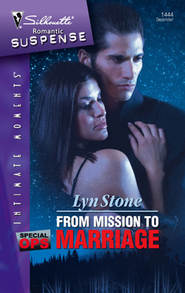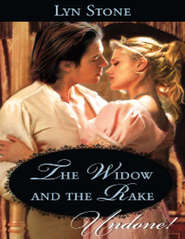По всем вопросам обращайтесь на: info@litportal.ru
(©) 2003-2025.
✖
Gifts of the Season: A Gift Most Rare / Christmas Charade / The Virtuous Widow
Настройки чтения
Размер шрифта
Высота строк
Поля
For what must have been the thousandth time in this past hour, Sara glanced at the tall case clock that, bedecked with a spray of holly and red ribbon for the season, stood in the corner of the drawing room. Only five minutes remained until seven, when, without fail, Lady Fordyce would marshal her guests for the short procession to the dining room table, and Sara and Clarissa would begin their own little procession upstairs to the nursery for their more humble meal.
Now four minutes were left: could fortune really be smiling upon her like this? Her heart racing, Sara smoothed the small muslin ruffle on the end of her sleeve. If Revell were like the rest of the guests gathered in this room, then he’d be staying at Ladysmith through Twelfth Night. Their paths were bound to cross before then—the manor was simply not so large a house that it could be avoided—but the longer the meeting could be postponed, the better. True, it was unforgivably rude for Revell not to have come here to the drawing room to greet his hostess before dinner on his first night, but for Sara it meant another day and night when her secret was still safe.
Three minutes. There was, of course, also the chance that Revell wouldn’t recognize her. Sara knew she was much changed since he’d seen her last. Her sorrows showed on her face, and the plain, serviceable way in which she dressed did little in her favor. Besides, as Clarissa’s governess, she was not much different nor more visible than any other family servant. Although she’d been standing here beside the window for the past hour while Clarissa had been petted and indulged by the others, she doubted any of the elegantly gowned ladies or handsome, laughing gentlemen had noticed her at all. She could only pray that Revell would do the same.
“Miss Blake,” said Lady Fordyce, sweeping toward Sara. She was a tall, handsome woman, kind and good-natured, who lavished upon her two children with the same fondness and devotion that her husband Sir David doted upon her. “I believe it is time for Clarissa to retire for the evening.”
“Yes, my lady,” said Sara with an efficient small curtsy to mask her relief. She’d be able to escape with two minutes to spare. “Clarissa has found the holidays most exciting.”
“I should blame her brother rather than the holidays,” said Lady Fordyce with an exasperated sniff as she watched her children. Held high upon Albert’s shoulder, a delighted Clarissa was shrieking Christmas songs as loudly as she could, pumping her arms up and down like a military bandleader and not at all like a young lady.
“Albert,” said Lady Fordyce sternly. “Albert! Please lower your sister directly so Miss Blake can take her upstairs!”
“Mama, no!” wailed Clarissa as Albert promptly set her down on the carpet with a shush of white petticoats. “It’s not time, not yet!”
“Alas, Clarissa, it most certainly is,” commiserated Sara as she took Clarissa’s hand. “Come now, kiss your mama good night.”
Clarissa’s face crumpled with disappointment as she appealed to the solemn ring of grown-up faces gazing down at her. She was the only child at present in the house, a position that she occupied like a little queen among her courtiers. But even queens could be banished, and Clarissa knew from sorrowful experience she could expect no reprieve from her mother once dinner was being served.
“And a kiss for me, too, Clary,” said Albert heartily, the way he did nearly everything. Although still in his twenties, he was already well on his way to being a model bluff English country gentleman, more fond of his dogs and his horses than the leather-bound books in his father’s library. “Who’s my only sweetheart girl, huh? Who’s my best darling sister?”
“That’s because I’m your only sister, Albert,” said Clarissa, but she kissed his ruddy cheek anyway. “As you know perfectly, perfectly well.”
“Your sister, Fordyce?” said a deep, low voice that Sara had thought she’d never hear again. “How could such a charming little sprite have you for a brother?”
Automatically Sara’s head turned in response, her heart racing and her feet urging her to flee. Revell was standing so near to her that she could see the tiny half-moon scar, pale against the clean-shaven shadow of his jaw.
Did he see that in his looking glass each morning and remember the night he’d come by it? How he’d cut himself as he’d climbed over the high wall that had surrounded her father’s grand white mansion on Chowringhee Road? Did he still recall how often he’d visited her—no, stayed with her, and loved her the glorious night through! Did he touch that scar now and remember her, how he’d slid over the rough stucco and through the thicket of trees and vines to reach the teak bench where she was waiting for him, there in the velvet heat of an Indian midnight?
“Little miss,” continued Revell, oblivious to Sara as he bowed to Clarissa. “I am honored.”
Fascinated, the girl slipped her hand free of Sara’s and stepped forward, spreading her skirts as she dipped coquettishly before this new admirer. All other conversation stopped while everyone listened and watched, curiosity turning them into eager, avid spectators. Word that the famous—some said infamous—Lord Revell Claremont had joined the party had raced through the house earlier, but this was the first real glimpse of him that most of them had had.
He did not disappoint. Though he smiled warmly enough at Clarissa, his eyes betrayed no emotion, and even standing still he seemed to have the restlessness and grace of a wild tiger, barely contained in impeccable black evening dress and white Holland linen.
Later Sara would overhear the whispers: how the ladies admired the splendid width of his shoulders, the intriguing aura of danger he wore as comfortably as his waistcoat, and the size of the cabochon sapphire—at least as large as a pigeon’s egg!—that he wore in a ring on his right hand, while the gentlemen noted the harsh lines fanning from those chilly blue eyes and the ruthless set of his mouth, souvenirs of living too long in a pagan place like India, and to a man they resolved never to cross a coldhearted bastard like Claremont.
But what Sara saw now was how all gentleness had vanished from Revell’s face, and how the hardness that had replaced it made her wonder sadly if he ever laughed anymore, or even could.
Lady Fordyce glided forward, resting one hand protectively upon her daughter’s shoulder while holding the other outstretched to Revell. The unspoken message in her posture was unmistakable to Sara; Lady Fordyce took her position and her responsibilities as the most prominent hostess in the county very seriously, and Revell had already grievously erred by coming down to the drawing room so late.
“Surely,” began Lady Fordyce, “you must be Lord Revell Claremont, yes?”
Revell nodded, lifting her hand to kiss the air over it. “Surely I am, my lady.”
“Then just as surely you may now take Lady Lawrence into dinner, my lord,” said Lady Fordyce, pointedly withdrawing her hand. “We are most honored by your presence here, my lord, but I do not wish to keep either my guests or my cook waiting.”
He bowed again, and turned toward Lady Lawrence, an older widow in lavender silk who was clearly as terrified as she was titillated to have him as her dinner companion. The others fell in by rank with their accustomed partners and followed through the arched door festooned with holly boughs, leaving Sara and Clarissa behind.
“Ooh, Miss Blake, didn’t I tell you!” exclaimed Clarissa with relish. “That Lord Revell is a wicked devil, isn’t he? He didn’t even tell Mama he was sorry, because he wasn’t!”
“Hush, Clarissa,” murmured Sara, still gazing toward the now-empty doorway. “It’s not fitting for you to speculate over Lord Revell’s character.”
They had stood not four feet apart, and he’d not noticed her. Not a glance, neither a smile nor a frown, no acknowledgment whatsoever that she’d ever meant anything to him that was worth remembering. She hadn’t dared hope their first meeting would happen with so little consequence. For now, anyway, she’d escaped.
But how was it possible for a broken heart to break again?
Chapter Two
With his elbows resting on the arms of the chair and fingers pressed together into a little tent over his waistcoat, Revell smiled across the room at Albert Fordyce, striving to project a relaxed bonhomie that he assuredly did not feel. They had outlasted all the other male guests tonight and had the room to themselves, though from the unfocused foolishness of Albert’s eyes and the nearly empty bottle of brandy beside him, Revell guessed he, too, would soon need help to his bed. If he wanted answers to the questions plaguing him, he’d better ask them now, before Albert was completely beyond coherent reply.
“So tell me of your sister’s governess,” began Revell, striving to sound idly interested and no more. “What do you know of her?”
“Clary’s governess?” Albert frowned, struggling to compose a reasonable answer to what clearly seemed an unimaginable question. “That dry little stick of a female?”
“Yes, your sister’s governess.” How could Albert speak so slightingly of Sara? And why did it seem to still matter so much that he did? “Though I should hardly call her a ‘dry little stick.”’
Albert stared with blank curiosity. “Wouldn’t you now?” he marveled. “She’s scarcely seemed worth the notice to me.”
“I noticed her.” How could he not, seeing Sara there like a flesh-and-blood ghost come back to haunt him? She was fine-boned and fair-skinned, true—the hot Indian climate often seemed to reduce English women to their very essence—but her delicacy had never seemed a fault to Revell. She’d been light as a fairy in his arms when they’d danced and vibrant with warm-blooded passion when they’d kissed, and lovely enough that every English gentleman in Calcutta had jostled for a favoring smile from her. “I thought her, ah, rather handsome.”
What kind of blasted understatement was that? He certainly wasn’t in love with Sara any longer, not the desperate way he’d been six years ago, but “rather handsome” didn’t begin to explain how he’d felt seeing her again. Where he’d simply grown older, she had somehow grown even more beautiful, her girlish brilliance burnished and refined by experience and time into a softer, more womanly elegance. She’d tried to hide it in those hideous clothes—shrouding herself in grim black and white, her bright curls skinned back beneath a plain cap—but how could she disguise the sunny blue of her eyes or the generous curve of a mouth made for laughing and teasing and lavishing with kisses?
Oh, aye, she was still Sara, still beautiful, still desirable, and still wretchedly, hopelessly unattainable.
“Ah, well, every man must pick his own poison,” said Albert blithely as he once again reached for the bottle beside his chair. “And here I thought you were taken with that saucy Talbot girl, the fine plump one making kitten’s eyes at you over dinner!”
Revell grimaced. He’d scarcely noticed the young woman sitting at his right until she’d freed her foot from her slipper and brazenly tickled her stockinged toes up and down his calf.
“No, don’t scoff,” said Albert. “I’d wager you’d find a warm welcome from that one, no mistake. But if Miss Blake’s the sort that catches your fancy, Claremont, well, that’s a different kettle entirely. I’d no notion that was how you felt.”
Thunderstruck, that’s how Revell had felt to discover Sara there beside him. Bowled over and blasted and for once so completely unable to trust his own emotions that he’d looked away, down to the little girl holding her hand.
And Sara—hell, Sara had ignored him as if he didn’t exist.
“That is her name, then?” In Calcutta she’d been Sara Carstairs. No wonder he’d not been able to find her since. “Miss Blake?”
“So she is called.” Albert shrugged carelessly, pouring the brandy in a sloppy arc into his glass. “Missy-Miss Priss Blake.”
Revell’s fingers tightened on the arm of the chair. When he’d returned to Calcutta from visting the mines in the hills, eager to announce their engagement, he’d been told that Sara hadn’t waited for him. The governor’s wife, who’d been appointed to tell him, had been as kind as possible, her voice full of pity. Sara’s father had died of a sudden apoplexy brought on by the record heat and dust of that last summer, and before the poor gentleman was scarce buried in his grave and his estate settled, Sara had eloped with a cavalry officer and sailed with him back to England.
It had, thought Revell, been the darkest day of his life.
“You are certain she’s unwed?” he asked now, praying that Albert was too far in his cups to hear the ancient disappointment in his voice. “There’s no, ah, Mr. Blake?”
“Not in this life.” Albert grinned, sinking even lower into his chair. “Mother wouldn’t have permitted it, not in a governess for Clary. She’s Miss Blake, evermore. Oh, she must have a Christian name somewhere, as well, but I’ve never heard it.”
“Why in blazes not?” asked Revell. He wasn’t exactly angry at Albert’s attitude, but it did, well, rankle since it was Sara they were discussing. Not that she needed a champion. Whatever she’d done since he’d seen her last, she’d proven herself perfectly capable of looking after herself without him—though, mercifully, without that dashing phantom cavalry officer, too. “The lass lives beneath your own roof, doesn’t she?”











